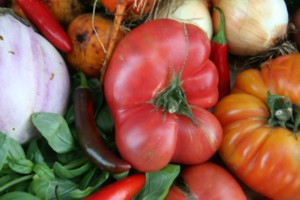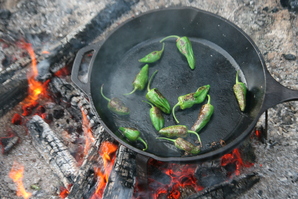Rogation Day
The Ladybug Letter is an open letter from Mariquita Farm to everyone with a curiosity about the people, practices, and politics of farming. We send it out every few (several) weeks when we have an article we think you all would love. We do continue to send a weekly newsletter every week year round with many recipes, notes about our events, CSA, notes from Andy (and often a full article from him), upick dates and messages, and more. Sign up for our Ladybug Postcard weekly email here. More about our frequent produce deliveries of bulk produce throughout the bay area at the bottom of this message. Tomatoes, Strawberries, Padron Peppers, Melons, and more!
Rogation Day by Andy Griffin

Christ the Good Shepherd Lutheran Church on Meridian Avenue in San Jose is one of our CSA vegetable box pick-up sites, and it has been for years. This week we start the third quarter of our seasonal harvest box deliveries and I want to thank everyone who has signed up to receive our farm’s produce again. I want especially to thank all of the pick-up site hosts who generously allow us to use their homes, their businesses, and their places of worship as distribution points. Without their patience and generosity of spirit Community Supported Agriculture programs like ours would be next to impossible to manage, and our farm would be history. I look at every pick-up site we service as a blessing. But beyond that, I’m a farmer, an employer, a manager of land, and I’ve got teenagers, so I can always use an extra blessing or two.

Pastor Bea, from Christ the Good Shepherd, emailed me a couple of days before the service. Meridian Avenue in San Jose is a long way from the fields these days, she pointed out. And Americans aren’t super traditional, so she had the idea that we could try to bring a little bit of the farm to the sanctuary; a bowl of soil, to be precise, and she would bless that, along with other bowls and sacks of soil from the backyard gardens of the people in the congregation. And people don’t necessarily know a lot about what goes on farms anymore, she wrote so would it be ok if I talked with her for a bit in front of the congregation during the service.

“The potatoes are all in the cooler now,” I answered, “and the tomatoes and peppers are starting. Planting is going on for the fall harvests.”
“And who is working at Mariquita Farm?” she asked.
“I have 20 employees,” I answered, “and some of them have worked with us since 1992. They are not ‘migrant workers.’ Nobody ‘migrates.’ The whole premise of the farm is year-round employment.”
“And how many families does your farm feed?”
“Besides my family, and the twenty families of my employees who depend on our farm for their livelihood, Mariquita Farm sends weekly boxes of produce to 600 families from Gilroy and Corralitos up to San Francisco,” I answered.
“And what dream or wish do you have,” she asked, ‘for the people or the land that you work with?”
“There are tens of thousands of children and young people in America,” I answered, “who came to the United States as babies of parents who worked in the fields, or on construction sites, or in hotels or restaurants. These kids have grown up as Americans, they are culturally American, and they have American dreams, but they have no future. In the thirty years that I’ve worked on farms and ranches around California and Oregon I’ve gotten to know some of them well. I listen to the radio and read the news and I understand the complexity and frustrations of the immigration situation as well as most, and I’m probably more familiar with the intestinal workings of immigration enforcement better than many, but I think that it is cruel, unworkable, and actually insane to talk about deporting these young “aliens” back to countries they barely know. My wish is that we Americans summon up the integrity for an honest debate what a real and comprehensive immigration policy should be, and my dream is that we welcome these kids in before we have a huge toxic permanent underclass that brings out the worst in everybody.”
There’s no harm in asking, I guess. They don’t call it a Day of Rogation for nothing.
My bowl of soil was blessed and I left the church feeling better than I had all week. It had been a hard week; two trucks had broken down, we’d fallen behind in transplanting, and there had been various and sundry scandals, half measures and frustrations to digest. It felt good to be reminded that in this venture I call Mariquita Farm we do have communities on our side. Thanks again to all of you. Andy
[More photos from Julia’s visit to Falling, Denmark.]
Copyright 2011 Article by Andy Griffin. Photos taken in Falling, Denmark by Julia Wiley.
Ladybug Truck Farm Deliveries We continue to visit San Francisco, Palo Alto, Santa Cruz, Menlo Park, Los Gatos, San Jose and more. Recently we’ve been selling the following things: melons, strawberries, padron peppers, genovese basil, olive oil from Belle Farms, and mystery boxes. 
What’s great about these deliveries for some families is that you just order when you want, what you want. On vacation? Not cooking? just ignore my little ‘reminder’ emails. The mystery boxes aren’t a CSA box, because you don’t pay ahead. You order one when you want, and show up and pay us and take your box.
We also have our traditional CSA that over 600 people love: There are many pick up sites and many home cooks like getting fresh veggies each week at the same location.
The tomatoes are just about here. It’s amazing how quickly the trickle of Andy bringing the precious first fruit for a simple salad in our kitchen turns into an avalanche! We will have several Saturday Tomato upick events, with a couple of weekdays too. Please do sign up for the ladybug postcard weekly email and or our Facebook page to get the latest news on when the upicks will be. Andy likes to schedule them once he sees the abundance of fruit. The San Marzanos and Heirlooms are looking gorgeous this year!
Adults Only — Pimiento de Padron U-Pick
Save the date! August 6th from 10am to 1pm
 So why an “adults only” Pimiento de Padron u-pick? Does Andy hate kids? No. Kids are welcome to come to the tomato u-picks that we are planning. But Padron pepper plants are brittle and the branches can easily be broken by harvesters who are perhaps more enthusiastic than subtle, and once the branches are broken any subsequent harvests are denied us. Plus, we’d like to have a small fire at the edge of the field with some cast iron pans so that Andy can cook up some Padron peppers for a picnic snack for pickers and I worry that someone’s child may get burned. Tomato plants, by contrast, are flexible and the yield is so dramatic that a few thousand tomatoes that get stepped on or squashed is no big deal. Besides Padron peppers, we will also have friarelli peppers and elderberries ready for picking. So, mark your calendar and stay tuned for further details soon! (make sure you’re on the postcard email list and or facebook fan to get these details)
So why an “adults only” Pimiento de Padron u-pick? Does Andy hate kids? No. Kids are welcome to come to the tomato u-picks that we are planning. But Padron pepper plants are brittle and the branches can easily be broken by harvesters who are perhaps more enthusiastic than subtle, and once the branches are broken any subsequent harvests are denied us. Plus, we’d like to have a small fire at the edge of the field with some cast iron pans so that Andy can cook up some Padron peppers for a picnic snack for pickers and I worry that someone’s child may get burned. Tomato plants, by contrast, are flexible and the yield is so dramatic that a few thousand tomatoes that get stepped on or squashed is no big deal. Besides Padron peppers, we will also have friarelli peppers and elderberries ready for picking. So, mark your calendar and stay tuned for further details soon! (make sure you’re on the postcard email list and or facebook fan to get these details)
Photo by Andy Griffin.


